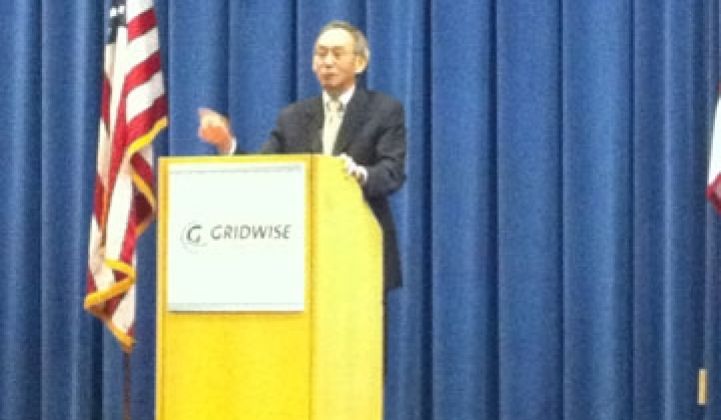Hundreds of industry players and high-level officials patiently waited to hear what U.S. Secretary of Energy Steven Chu had to say about green energy at the GridWise conference this afternoon.
Chu began his address by citing the inspiration of Thomas A. Edison, who laid the foundations of our power grid with the Pearl Street Station power plant in Manhattan more than a century ago.
“I ask that we return to the days of Edison,” Chu said.
If Edison came back and looked at an iPod, he’d ask, what is this? “However, if he looked at the power distribution, he’d feel right at home. He’d recognize the pieces,” Chu said. Our aging grid is a sad situation.
The grid needs to be modernized though renewable integration, energy storage, load management, system operation, cyber security and physical security. As we move towards more automation, we’ll have more concerns about cyber security, according to Chu.
That said, Chu said there are new investments in cyber security, with ten projects totaling more than $30 million in funding.
In Chu’s professorial talk, he maintained a positive demeanor, only pointing out the nation's weaknesses via oblique quotes and baseball analogies.
“Energy storage is a big deal,” Chu said, noting that the federal government is putting $620 million into demonstration projects.
For example, Aquion and Carnegie Mellon are building a new battery, made with an aqueous sodium-ion based electrode. Beacon Power received a $43 million loan for a 20MW flywheel project.
Chu also prompted audience members to recall that the U.S. is active on the international front. The government recently held discussions on the smart grid and energy efficiency with 15 countries.
“It was very satisfying. No one was pointing fingers at each other and blaming each other. Everyone was there to help each other transition to clean energy,” Chu said.
Chu also pointed out that the smart grid vendor landscape is more mature and geographically diverse than ever before. In 2010, $2.75 billion will be spent on smart grid projects.
He also underscored the need to figure out where we want to go with the smart grid and to develop new technologies according to this strategic plan.
“We are a major supporter and developer of technologies that are yet to be invented. The most dramatic progress in science and technology occurred during golden moments of time and space,” Chu said.
Then Chu pointed to a slide depicting Bell Labs, in Murray Hill, New Jersey, where he used to work. Scientists are groomed and mentored there, often hired fresh out of doctoral programs. It’s no coincidence that in that innovative atmosphere, 17 Bell Labs scientists were awarded the Nobel Prize. A number of game changing inventions came out of the labs, including the transistor and silicon solar cell.
Can one generate the same innovative spirit for the smart grid?
“We want to fund innovative things that stretch the imagination,” Chu said. “We want home runs and grand slams, not bunts and singles,” he said. Of course, when you swing for a home run, you are more likely to strike out.
Chu knows the federal government is funding some projects that could fail. One is the all liquid-metal battery, which was inspired by aluminum refiners that could provide grid-scale energy storage at one-twentieth of the cost. You can make a pool-sized battery. This would get around the limitations of lithium-ion batteries.
“It’s not all high-tech stuff. We are also funding the human factor. We want to know how people think about and use energy,” he said.
Chu also noted the importance of educating customers about the benefits of a smarter grid, and cited the prospect of understanding consumer behavior as a major challenge.
“Energy is about saving money. Like it or not, we will save you money,” Chu said. That’s why the government is targeting kids, hoping they can influence their parents to do the right thing.
Chu pointed to the slide with a picture of "Earth-rise" from the Apollo 8 mission, which shows a bleak lunar surface and a clear view of our planet.
“We came all this way to explore the moon, and the most important thing we discovered was the Earth,” Chu quoted Apollo 8 astronaut Bill Anders as saying.
Chu observed that we are changing the planet. Virtually all well-respected scientists have acknowledged the compelling body of evidence that shows that this is happening, and we need to do something about it. “We have the chance to be a new generation of Edisons. Or in ten years, we can import these technologies. It’s our choice,” he said.
And that’s exactly what this packed room wanted to hear -- a perfect ending to the well-received lunchtime address. Hopefully Chu’s spirit of enthusiasm can inspire the radical innovation that the country desperately needs.



